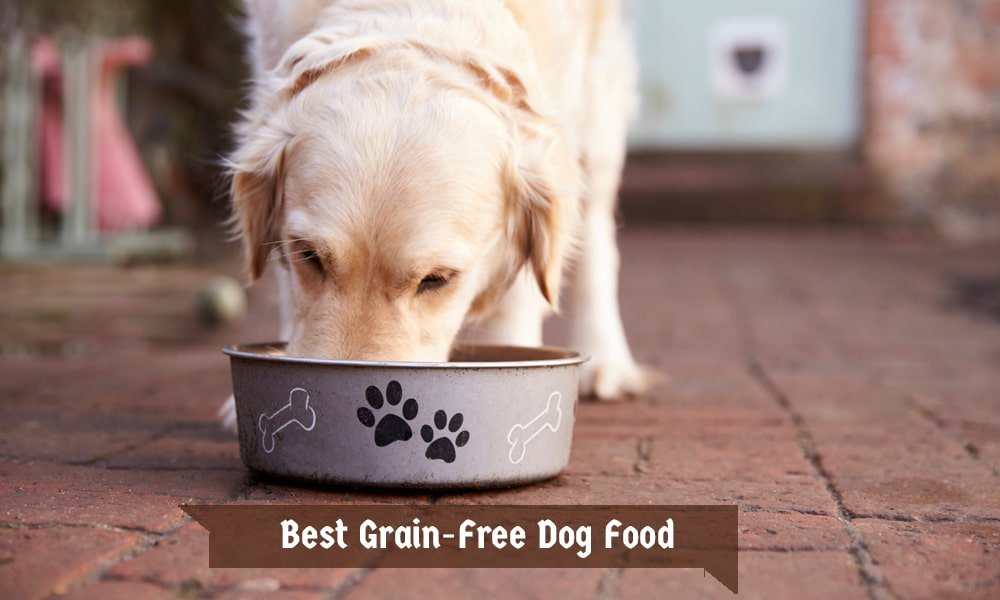
Some dogs need a grain free diet, but the truth is that they’re a bit of a trend right now. You should always choose the best food for your dog based on their needs, and not all canines need a grain free dog food. We’re going to take a deep dive into everything you need to know about grain free dog food to help you decide if a grain free diet is right for your dog. Then, we’ll show you our picks for the best grain free dog food out there.
Contents
- Do All Dogs Need a Grain Free Diet?
- Is It really Healthier for a Dog to Eat Grain Free?
- Misconceptions about Grains
- Benefits of Grain
- What Do These Recipes Substitute for Grain?
- Are There Any Health Concerns with Feeding Your Dog a Grain Free Diet?
- What to Look for in a Grain Free Food
- The Best Grain Free Dog Food
- 1. Merrick Grain Free Dry Dog Food Healthy Weight Recipe
- 2. WholeHearted Grain Free All Life Stages Chicken & Pea Recipe
- 3. Health Extension Grain Free Chicken & Turkey Recipe
- 4. Orijen Puppy Dry Dog Food Formula
- 5. Nature’s Recipe Grain Free Easy to Digest Dry Dog Food
- 6. Purina Pro Plan Sport High Protein Grain Free
- 7. Purina Beneful Adult Dry Dog Food
- 8. Hill’s Science Diet Dry Dog Food Sensitive Stomach & Skin Recipe
- 9. Blue Buffalo Freedom Grain Free Natural Adult Dry Dog Food
- 10. Blue Buffalo Basics Limited Ingredient Diet Grain Free Natural Adult Dry Dog Food
- 11. Taste of the Wild Grain Free High Protein Pacific Stream Premium Dry Dog Food
- It’s Best to Talk to Your Vet
Do All Dogs Need a Grain Free Diet?
There is a lot of confusion around whether grain free dog food is best for a dog and the truth is that most can digest the grains used in dog foods without a problem. Without getting too technical, some people believe that this is likely because of domestication. As dogs adapted to survive alongside humans, they began producing more of a digestive enzyme called amylase than wolves, allowing them to digest grains easily.
Most dogs can digest wheat, corn, and rice without a problem, so in most cases, you can use a regular food for your dog’s food without worry. But there are some cases when it’s best to avoid grain. Some do indeed need grain free foods.
Is It really Healthier for a Dog to Eat Grain Free?
Generally, no. Grains do have some benefits for dogs. You should never give your dog a grain-free diet just because you want to or because you yourself avoid gluten or carbs.
That said, there are some cases where your vet may recommend a grain free recipe. They include:
Picky eaters that won’t eat grains
Grains are not necessarily harmful to your dog, but they’re not irreplaceable. Though rare, some dogs may refuse to eat food with grains. Most like the taste of grains so this isn’t a common problem, but it is possible.
True allergies to wheat, corn, or other grains
Most food allergies in dogs are not caused by grain, but some may have a true sensitivity. This usually presents as itchy skin. It’s never a good idea to assume you know what is causing this kid of reaction, so always check with your vet to make sure there isn’t something else going on before changing to a grain free diet. The vet will likely recommend a limited ingredient diet to get rid of allergy symptoms, then slowly add ingredients back in to try to pinpoint the allergen.
Difficulty digesting grain
Some people mistake this for a grain allergy, but they are not the same. Some dogs may have trouble digesting grain, leading to bloating, gas, and diarrhea. Vets usually call this a food intolerance instead of an allergy. If you notice these symptoms in your dog, talk to your vet. There’s a good chance they will recommend grain free dog foods for your dog.
Misconceptions about Grains
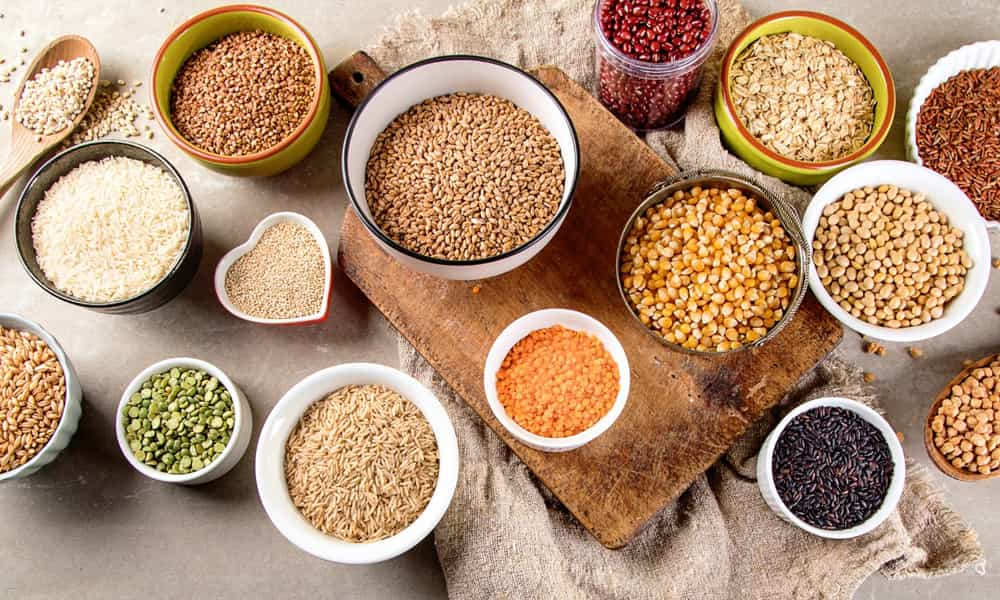
There are a lot of misconceptions about grain out there, and it’s important to understand the truth to choose the best dog food for your dog. There aren’t any benefits to switching to grain free foods unless your dog has a condition that would benefit from going grain free. If anything, unnecessarily switching your dog’s diet results in more GI upset.
To help you make a more informed decision about which dog food is the best, here are some of the most common misconceptions about grain.
Grain free foods are high in protein.
A lot of people think that grain free food automatically means the recipe is high in protein, but this is not the case. Most recipes include ingredients to replace the fiber and carbohydrates in grains, and the amount of protein stays about the same. If you want a high protein dog food, look for one that specifically mentions that it is high protein on the label. It should contain 30 percent protein or higher.
Grain free food doesn’t have carbs.
The truth is that the ingredients used in place of grains are rich in carbohydrates. Look at the label to find out what is being used as a substitute for grain and you will see that grain free food does in fact have a healthy amount of carbohydrates.
Grains are not a part of a dog’s ancestral diet.
This is true, but fails to take into account that dogs have been domesticated for roughly 14,000 years. They do have some wolf DNA in them, but they have also evolved to be able to digest grain. Not to mention, wolves likely ate some grain, too.
Grains are the most common cause of allergies in dogs.
This is one of the most common misconceptions about grains. While some dogs may experience GI upset when eating grains, this is not often due to an allergy. Grain allergies usually present as itchy skin, though many environmental factors can cause this, too. Some people are surprised to learn that most food allergies in dogs stem from dairy, chicken, and beef. Not grains.
Benefits of Grain
It is certainly true that some dogs do require grain free foods, but most pets do not need grain free dog food.
Diets rich in fiber encourage GI health and can help prevent bowel diseases. The fiber found in grain also delays gastric emptying, normalizing get motility and helping the dog feel fuller longer.
Whole grains are also a great source of vitamins, minerals, and protein and can help encourage healthy bacteria growth in the gut. The best dog foods use these types of grain.
Grains also contain less fat than meat. If your dog is overweight and you’re looking for a food that’s protein rich, a lot of low-fat reduced calorie diets include grain. They can be a high-quality source of protein if you’re trying to reduce fat by cutting out meat.
What Do These Recipes Substitute for Grain?
Grains are a good way to boost calorie content and add fiber to encourage healthy digestion. So, when grains are removed, they have to be replaced with something comparable. Most recipes use alternate ingredients that are rich in carbohydrates, like chickpeas, lentils, peas, potatoes, and sweet potatoes.
Are There Any Health Concerns with Feeding Your Dog a Grain Free Diet?
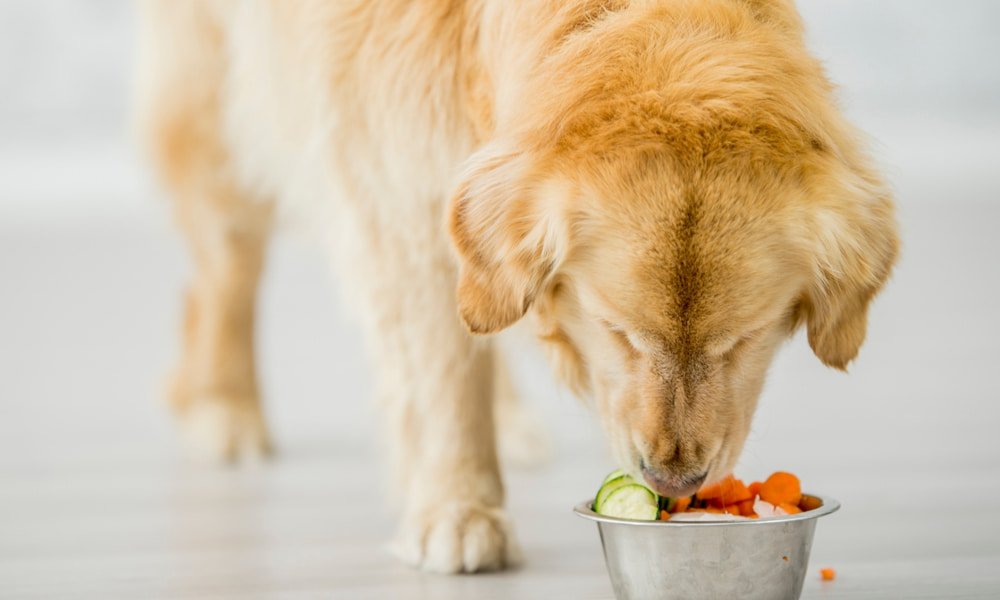
Grain free diets are considered healthy for dogs who need them, but grain free dog foods are pretty new and no one is really sure of the long term effects of a diet without grain.
One study by the FDA indicated that there may be a relationship between grain free diets and those that contain peas or lentils with dilated cardiomyopathy. This is a heart condition that decreases the heart’s ability to pump blood effectively. The study showed that the condition resolved or improved when some of the dogs in the study were taken off their grain free diet and started taking taurine, an amino acid supplement.
Nothing conclusive has been determined as more research is necessary. But this is part of the reason why it is so important to talk to your vet before starting grain free diets. Some breeds are already prone to heart problems and this type of food may be discouraged. In any case, your vet will need to closely monitor your dog for any signs of heart disease.
What to Look for in a Grain Free Food
If you talked to your vet and everyone is on board with a a new recipe, you can’t just pick the first one you see on the shelf. Here are some things to look for to make sure you get the best grain free dog food possible.
Make sure the first ingredient is a whole protein.
In dry dog food, the first ingredient should always be a whole protein. Meat meals, like chicken meal, are fine, but they should always appear a little further down the list. If you prefer wet dog food, the first ingredient is usually water. This is fine and part of the draw of wet foods, but make sure the second ingredient is a whole protein.
Stay away from by-product meals.
Meat meals from whole protein are fine. Meals are nothing but meat with the water removed, resulting in a concentrated form of protein. That said, with by-product chicken meal, you never really know where the protein is coming from and there’s a chance that it includes unsavory or unhealthy ingredients from parts of the cow or chicken that you might not want your dog to eat.
Avoid artificial colors, flavors, and preservatives.
These things are much more likely to cause sensitivities or allergies than grain and you should always avoid them if you can. If your dog’s food is made of high quality ingredients, there is no need for anything artificial.
You want a food rich in fatty acid and antioxidants.
Omega 3 and 6 fatty acids are essential for your dog’s health. They reduce inflammation and are important for brain development. They also contribute to healthy skin and coat. Most foods high in fatty acid will say so right on the label, but look for ingredients like flaxseed oil or fish oil.
Fruits and vegetables are a great source of antioxidants, which protect the body from free radicals and support the immune system. Again, foods rich in antioxidants usually display this on the label, but there are some ingredients to look for. They include blueberries, pumpkin, pomegranate, raspberries, spinach, kale, tomatoes, carrots, and sweet potatoes.
Consider a probiotic to encourage healthy digestion.
Probiotics help your dog digest more effectively and can help prevent gas and diarrhea.
The Best Grain Free Dog Food
If you’ve decided that a grain free dog food is for you and are wondered which best dog food you should pick, check out out top 11 picks for grain free dog foods.
1. Merrick Grain Free Dry Dog Food Healthy Weight Recipe
If you’re looking for a grain free food that helps control your dog’s weight, take a look at this grain-free recipe from Merrick. The first ingredient is real deboned beef. There’s also chicken meal, turkey meal, and salmon meal for a total protein content of 55 percent. This high protein content provides the energy your dog needs to keep going and helps build lean muscle mass.
The remaining 45 percent is made up of fiber, fruits, and vegetables as well as added vitamins and minerals. Look at the label and you’ll find wholesome ingredients like sweet potatoes, apples, blueberries, and peas. This recipe also contains glucosamine and chondroitin promote healthy joints and omega fatty acid to support a lustrous coat and healthy skin.
This grain free natural dog food is made in the USA. It contains no soy, wheat, corn, or gluten and not artificial preservatives.
2. WholeHearted Grain Free All Life Stages Chicken & Pea Recipe
This grain free food from WholeHearted is meant for all life stages. The first ingredient is real chicken, followed by other wholesome and natural ingredients like lentils, peas, flaxseed, chickpeas, and salmon oil. Probiotics support your dog’s digestive health, and there are omega-3 fatty acids for healthy skin and coat.
WholeHearted’s chicken and pea recipe contains no corn, wheat, or other grains. It has added vitamins and minerals for optimal nutrition and the antioxidant rich formula supports a health immune system. There are other flavors available, too, including beef, duck, lamb, and salmon.
3. Health Extension Grain Free Chicken & Turkey Recipe
Another great option for a grain free dog food is this chicken and turkey recipe from Health Extension. It’s made using delicious, real proteins like organic chicken, deboned turkey, chicken and turkey meal. Other wholesome ingredients include fresh whole sweet potatoes, pumpkin, carrots, blueberries, cranberries, tomatoes, beets, spinach, and parsley. Ingredients are sourced from traceable and sustainable sources.
This food includes no corn, wheat, or fillers and no artificial preservatives, flavors, or colors. Health Extension also includes a proprietary blend of vitamins, minerals, and antioxidants, including ingredients like pure coconut oil, turmeric, and organic apple cider vinegar.
Health Extension has been family-owned for three generations. It’s slow cooked in small batches for quality control and proudly made in the USA.
4. Orijen Puppy Dry Dog Food Formula
If your vet recommends grain free food for your puppy, this food by Orijen is a great choice. It’s high in protein and low in carbs, made up of a blend of meats, fruits, vegetables, and grasses. The first several ingredients in this food are high quality meat: deboned chicken protein, deboned turkey, and Atlantic flounder. Other wholesome protein ingredients include chicken liver, turkey liver and heart, Atlantic herring, and there are also green beans, lentils, whole chickpeas, navy beans, and whole carrots, apples, and pears.
This recipe is a great source of fatty acids for brain and cell developing and to encourage healthy skin and coat. It’s loaded with delicious ingredients and provides your puppy with well-rounded nutrition.
5. Nature’s Recipe Grain Free Easy to Digest Dry Dog Food
Real salmon is the first ingredient in the grain free dog food from Nature’s Recipe. This recipe also includes healthy pumpkins and sweet potatoes for a nutrient-dense, easy-to-digest recipe. It’s great for all adult dogs, even seniors, and has the added vitamins and minerals your dog needs to thrive.
This salmon, sweet potato, and pumpkin dog food recipe contains no corn, soy, or wheat, and they never use any artificial flavors, colors, or preservatives. There are other recipes available, too, including sweet potato and pumpkin recipes with chicken or lamb instead of salmon.
6. Purina Pro Plan Sport High Protein Grain Free
Purina Pro Plan Sport is a protein rich grain-free recipe for active dogs. Real chicken is the first ingredient, and the concentrated nutrition helps optimize performance and increase endurance in high-performance dogs. Antioxidant-rich ingredients support the immune system and protect against free radicals, and amino acids support muscle development and repair in that crucial period after exercise.
This recipe contains 30 percent protein and 20 percent fat with no artificial flavors, colors, or preservatives. This high amount of protein is ideal for breeds that are extremely active. It’s packed with omega 3 fatty acids for healthy skin and coat and glucosamine to support joint health and maintain active mobility.
7. Purina Beneful Adult Dry Dog Food
Another grain free dog food from Purina is Beneful, made with real farm-raised chicken as the first ingredient. With no corn, wheat, gluten or fillers, this recipe includes a range of ingredients, like blueberries, dried pumpkin, and dried spinach.
This recipe includes no animal by-product meals and no artificial flavors, colors, or preservatives. With 23 vitamins and minerals, you can be sure this food provides your dog with 100 percent of the nutrition it needs to thrive.
8. Hill’s Science Diet Dry Dog Food Sensitive Stomach & Skin Recipe
One of the primary reasons that people want to find grain free dog food for their pet is because the dog is experiencing GI upset or dry, itchy skin. This recipe from Hill’s Science Diet was developed specifically for pets with these sensitivities.
In addition to being grain free, this recipe also includes prebiotic fiber to support digestive health and improve your dog’s microbiome. It’s easily digestible, too, which leads to better nutrient absorption and formed stools.
Omega 6 fatty acids support skin health and a shiny, lustrous coat, and it has all the vitamins and minerals your dog needs to thrive. Ingredients include chicken protein, yellow peas, potatoes, dried beet pulp, apples, cranberries, carrots, and broccoli.
9. Blue Buffalo Freedom Grain Free Natural Adult Dry Dog Food
This grain free food from Blue Buffalo starts with real chicken as the main protein and includes other high-quality ingredients that your dog will love, including blueberries, cranberries, whole peas, sweet potatoes, and carrots.
Like a lot of foods from Blue Buffalo, this recipe includes LifeSource Bits, a perfect blend of vitamins, minerals, and antioxidants carefully blended to support your dog’s immune system and life stage requirements. It also has omega 3 fatty acids to support skin and coat health.
Blue dry dog food is made without any poultry by-product meals and contains no corn, soy, wheat, or artificial preservatives or flavors.
10. Blue Buffalo Basics Limited Ingredient Diet Grain Free Natural Adult Dry Dog Food
Another great choice from Blue Buffalo is this limited ingredient dry dog food. If your dog has severe food sensitivities, this recipe is one you should consider. It uses real turkey as the first ingredient, and turkey is the single source of animal protein. Other ingredients include peas, potatoes, and pumpkin to provide the necessary vitamins and minerals while also supporting digestive health.
Because this is a limited ingredient food meant for pets with sensitivities, it doesn’t contain any of the most common allergens, like chicken, beed, corn, soy, eggs, or wheat. That said, it’s formulated to provide essential protein and carbohydrates needed to stay healthy. Carbohydrate sources include pea fiber, pumpkin, and potatoes. Blue’s LifeSource Bits provide the antioxidants, vitamins, and minerals your dog needs for a strong immune system and a healthy oxidative balance.
11. Taste of the Wild Grain Free High Protein Pacific Stream Premium Dry Dog Food
This food from Taste of the Wild is formulated to be, well, a taste of the wild. Real salmon is the number one ingredient, and it has an optimal amino acid profile to support lean, strong muscle growth.
Taste of the Wild uses only premium ingredients and superfoods to provide the antioxidants and fatty acids your dog needs for optimal health. As always, Taste of the Wild uses no artificial flavors, colors, or preservatives and this recipe contains no gran, wheat, corn, or filler. There are a lot of other Taste of the Wild recipes that are grain free, too. If your dog isn’t a fan of salmon, they can get a taste of the wild from dog foods with other sources of protein.
It’s Best to Talk to Your Vet
Grain free dog food is certainly a good choice for a dog with sensitivities, but most healthy dogs don’t need these special foods. It’s always a good idea to talk to your vet before switching your dog to a new food. Especially since there may be some health risks to eating a steady diet of grain-free food.
Grain free foods are somewhat trendy, but you should never choose your dog’s food because it’s popular or the new fad. There are a lot of misconceptions about grain in dog food. A lot of people use the argument that our dog’s ancestors didn’t eat grains so modern dogs shouldn’t either, that we should give our dogs a true taste of the wild. While modern dogs do share some of their DNA with ancient wolves, they have also evolved over thousands of years and easily digest grains.
That said, there are some dogs that have legitimate health issues that require grain-free dog food. That’s why it’s always best to talk to your vet first before making any big changes to your dog’s diet. If you do decide to try it, try one of our chosen dog food brands for the best grain free dog food.
I grew up in a household that was filled with animals. I believe that my fate as a dog-loving person was sealed in early childhood since my parents owned several dogs of varying sizes and breeds. There was no choice but to take care of and learn about dog habits and the best animal care practices — otherwise, I’d be clueless about how to go about the creatures I was surrounded by day and night.
As a life-long puppy lover, I know a thing or two about dogs and how to go about caring for them in the best way possible. Although I’m not a professionally trained dog behaviorist, trainer, or veterinarian, all of my knowledge and experience with canines comes from a place of love and a deep-rooted passion for dogs and animals in general.
Seeing as dogs kept me company throughout every stage of my life, I decided to follow a different path in my academic life and obtained a Bachelor’s and Master’s degrees in Marketing Management and Digital Advertising, which ultimately allowed me to combine my professional training and personal experience by creating the ultimate dog lover’s resource website! Along with my husband, Dave, I run MySweetPuppy for like-minded dog lovers who want to have a single, clear, and reliable information source about anything and everything related to dogs and their well-being.

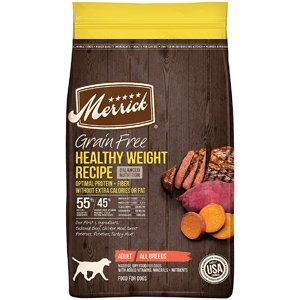
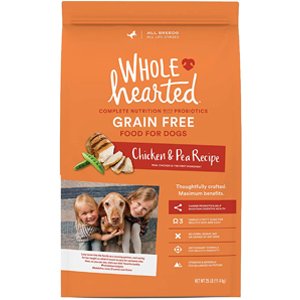
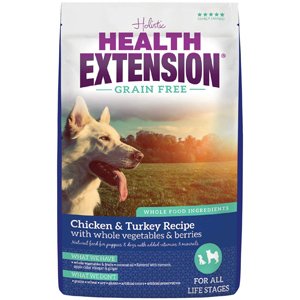
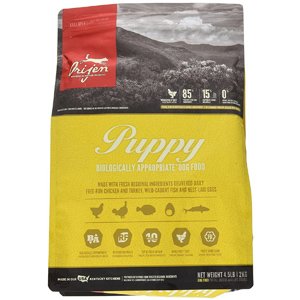
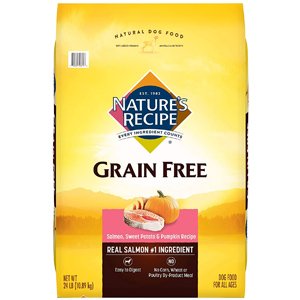
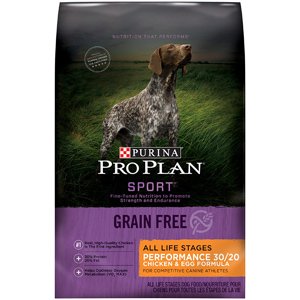
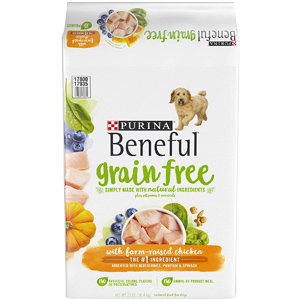
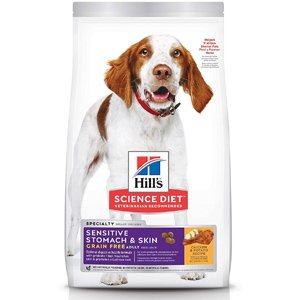
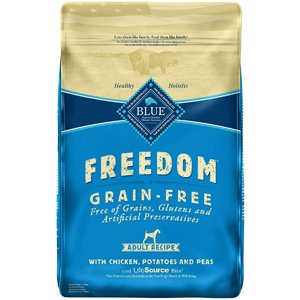
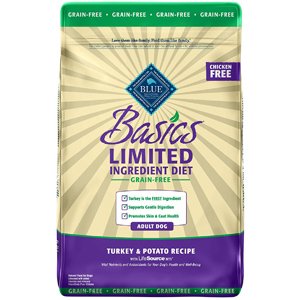
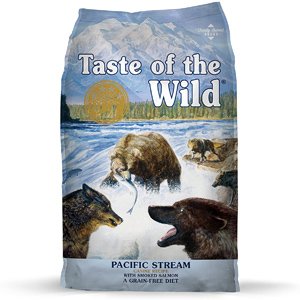
![The Best 4 Low Sodium Dog Foods [2021 Buyer’s Guide]](https://mysweetpuppy.net/wp-content/uploads/2015/12/low-sodium-dog-food1.jpg)
